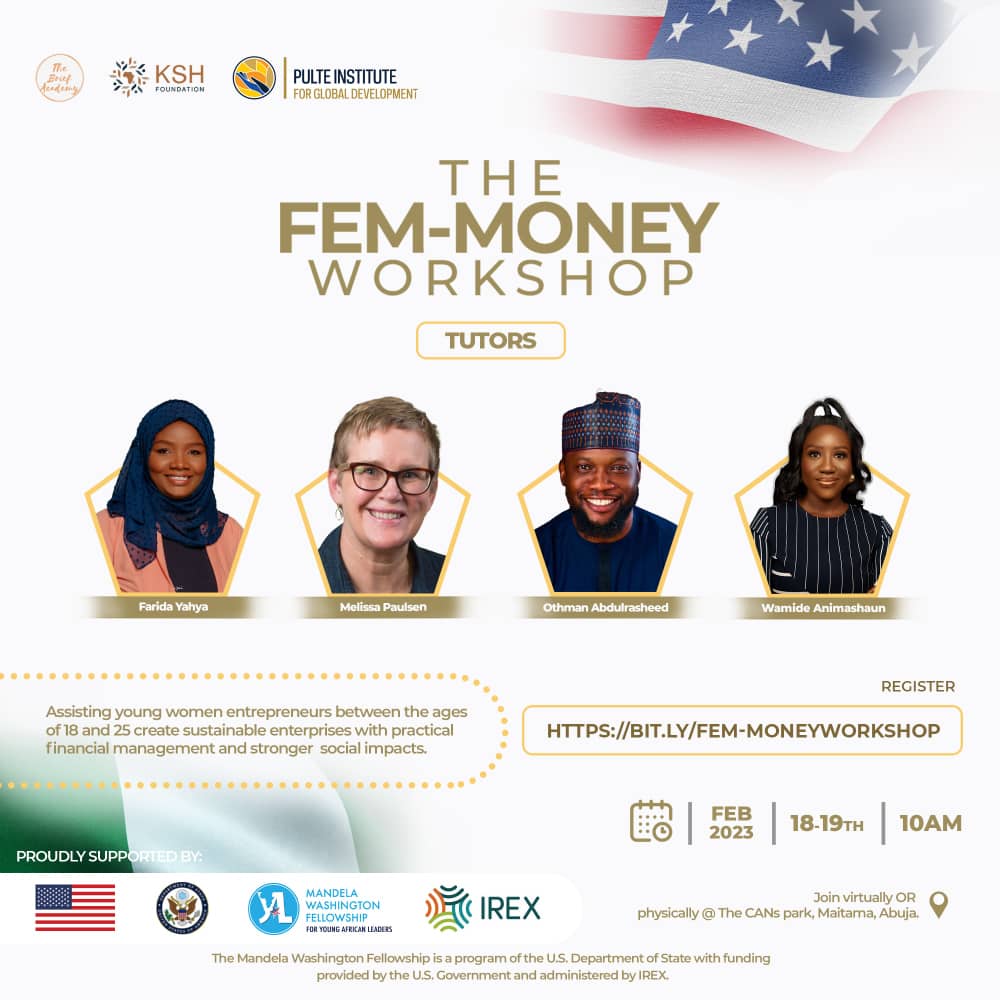By Ene Oshaba
The Brief Academy in collaboration with the Pulte Institute for Global Development and the Khalil Halilu (KSH) Foundation in its bid to sensitise and educate more young women on the importance of financial independence has launched the FEM-Money.
FEM-Moneya is a hybrid workshop assembled to assist young women entrepreneurs to create sustainable enterprises with practical financial management and social impacts.
According to Farida Yahya, Founder of the digital learning hub, the Brief Academy is dedicated to developing and supporting female-owned startups, and a fellow of the Mandela Washington Fellowship for Young African Leaders.
“Our goal is to sensitise and educate more young women on the importance of financial independence and the skills required towards building a scalable business with impact in their immediate community,” she said
“All of the workshops’ courses are uniquely designed to equip these budding entrepreneurs with practical steps and skills needed en route to financial independence,” she added.
She explained further that the FEM-Money Workshop was set up to accommodate entrepreneurs from far and wide, adding that it will work with a number of expert tutors with adept experience in design thinking and expansion strategies to broaden participants’ perspectives on potential investment portfolios extremely beneficial to their enterprises.
“The hiring of female CEOs by prominent companies like General Motors (GM), Orange, and Deloitte Africa as well as more women running fortune 500 businesses today than at any point in history suggests that the trend towards women in leadership positions is expanding, ” she said.
She however said when put into comparison, the numbers are less, adding that inequality is still a significant business issue.
In his submission, the founder of KSH Foundation Khalil Halilu, described business as a game of numbers, noting that in spite of the fact that almost every business in a community doubles as social impact, if there are no profits, and figures were not being recorded and tracked, then that business is not producing any value so to.
“Creating a business with a positive social impact is as important as creating a business in itself. With the country’s population spilling over 200 million and 70-80% living below the poverty line.
“Starting a business play the roles of helping one secure their financial well-being, that of their families, and of certain members of their local community, thus lowering social decadence and increasing economic growth,” he added.
One of the Resource Persons Wamide Animashaun, while speaking on financial literacy said, the country is at a stage where small businesses can get alot of accelerator and enablers that could help particularly women, to access loan.
She encouraged the young entrepreneurs to get interest free loans to grow their businesses stressing the importance of being financially self reliant.
“If you feel you are not earning enough from a present job you can upskill and try to develop yourself,” she said.
A participant , Florence Godwin who is the founder of a culinary school lauded the organisers of the training , adding that she has been enlightened more about loans available for business
“My take home basically was that, I should not be afraid of taking loans, before now I have been afraid to do this although the money I used to start my business was a loan but interest free.”
Another participant, a graphic designer, Ezewanyi Grace Oluwatoyin, while appreciating the organiser said, she learnt the difference between savings and investment, as savings are meant for emergencies while investment look into the line of asset.
“I learnt about how to create a budget, the 50-30-20 rule as investment should be more and spending less.”
FEM-Money is supported by the Mandela Washington Fellowship for Young African Leaders, a program of the U.S.Department of State, funded by the U.S Government and administered by International Research and Excange Exchanges Board (IREX).
Pulte Institute for Global Development, integral part of the Keough School of Global Affairs that works to address global poverty and inequality through policy, practice and partnership.

